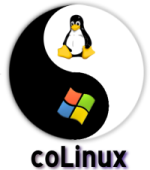Related Research Articles

A Linux distribution is an operating system made from a software collection that includes the Linux kernel, and often a package management system. Linux users usually obtain their operating system by downloading one of the Linux distributions, which are available for a wide variety of systems ranging from embedded devices and personal computers to powerful supercomputers.

Smalltalk is a purely object oriented programming language (OOP), created in the 1970s for educational use, specifically for constructionist learning, at Xerox PARC by Learning Research Group (LRG) scientists, including Alan Kay, Dan Ingalls, Adele Goldberg, Ted Kaehler, Diana Merry, and Scott Wallace.

Squeak is an object-oriented, class-based, and reflective programming language. It was derived from Smalltalk-80 by a group that included some of Smalltalk-80's original developers, initially at Apple Computer, then at Walt Disney Imagineering, where it was intended for use in internal Disney projects. The group would later go on to be supported by HP labs, SAP, and most recently, Y Combinator.
Virtual PC is an x86 emulator for PowerPC Mac hosts and a virtualization app for Microsoft Windows hosts. It was created by Connectix in 1997 and acquired by Microsoft in 2003. The Mac version was discontinued in 2006 following the Mac transition to Intel, while the Windows version was discontinued in 2011 in favour of Hyper-V.

Cooperative Linux, abbreviated as coLinux, is software which allows Microsoft Windows and the Linux kernel to run simultaneously in parallel on the same machine.
Miva Script is a proprietary computer scripting language mainly used for internet applications such as e-commerce. As of 2015, it is developed, maintained and owned by Miva Merchant, Inc., based in San Diego, California. Many web hosting companies support Miva Script on their servers, but it is significantly less widespread than other popular web languages.
The following tables compare general and technical information for a number of wiki software packages.
A web content management system is a software content management system (CMS) specifically for web content. It provides website authoring, collaboration, and administration tools that help users with little knowledge of web programming languages or markup languages create and manage website content. A WCMS provides the foundation for collaboration, providing users the ability to manage documents and output for multiple author editing and participation. Most systems use a content repository or a database to store page content, metadata, and other information assets the system needs.
In computing, a virtual folder generally denotes an organizing principle for files that is not dependent on location in a hierarchical directory tree. Instead, it consists of software that coalesces results from a data store, which may be a database or a custom index, and presents them visually in the format in which folder views are presented. A virtual folder can be thought of as a view that lists all files tagged with a certain tag, and thus a simulation of a folder whose dynamic contents can be assembled on the fly, when requested. It is related in concept to several other topics in computer science, with names including saved search, saved query, and filtering.
OS-level virtualization is an operating system (OS) paradigm in which the kernel allows the existence of multiple isolated user space instances, called containers, zones, virtual private servers (OpenVZ), partitions, virtual environments (VEs), virtual kernels, or jails. Such instances may look like real computers from the point of view of programs running in them. A computer program running on an ordinary operating system can see all resources of that computer. However, programs running inside of a container can only see the container's contents and devices assigned to the container.
Parallels Desktop for Mac is software providing hardware virtualization for Macintosh computers with Intel processors, and since version 16.5 also for Apple silicon-based Macintosh computers. It is developed by Parallels, since 2018 a subsidiary of Corel.

Oracle VM VirtualBox is a type-2 hypervisor for x86 virtualization developed by Oracle Corporation. VirtualBox was originally created by InnoTek Systemberatung GmbH, which was acquired by Sun Microsystems in 2008, which was in turn acquired by Oracle in 2010.
CrushFTP is a proprietary multi-protocol, multi-platform file transfer server originally developed in 1999. CrushFTP is shareware with a tiered pricing model. It is targeted at home users on up to enterprise users.
VHD and its successor VHDX are file formats representing a virtual hard disk drive (HDD). They may contain what is found on a physical HDD, such as disk partitions and a file system, which in turn can contain files and folders. They are typically used as the hard disk of a virtual machine, are built into modern versions of Windows, and are the native file format for Microsoft's hypervisor, Hyper-V.
QVD is an open-source virtual desktop infrastructure (VDI) product built on Linux. Its main purpose is to provide remote desktops to users.

Qubes OS is a security-focused desktop operating system that aims to provide security through isolation. Virtualization is performed by Xen, and user environments can be based on the officially supported Fedora or Debian, or with the community supported Whonix, Ubuntu, Arch Linux, CentOS, or Gentoo.

Proxmox Virtual Environment is a hyper-converged infrastructure open-source software. It is a hosted hypervisor that can run operating systems including Linux and Windows on x64 hardware. It is a Debian-based Linux distribution with a modified Ubuntu LTS kernel and allows deployment and management of virtual machines and containers. Proxmox VE includes a web console and command-line tools, and provides a REST API for third-party tools. Two types of virtualization are supported: container-based with LXC, and full virtualization with KVM. It includes a web-based management interface.
In computing, a system virtual machine is a virtual machine (VM) that provides a complete system platform and supports the execution of a complete operating system (OS). These usually emulate an existing architecture, and are built with the purpose of either providing a platform to run programs where the real hardware is not available for use, or of having multiple instances of virtual machines leading to more efficient use of computing resources, both in terms of energy consumption and cost effectiveness, or both. A VM was originally defined by Popek and Goldberg as "an efficient, isolated duplicate of a real machine".
References
- ↑ "Swiki.net: Review & Rating". PC Magazine. 2003-12-30. Retrieved 2007-11-11.
- ↑ Murali, J. (2003-06-09). "A Squeak-based Wiki server". The Hindu . Retrieved 2007-11-11.
- ↑ "Georgia Tech Wipes Class Wikis From Web". Chronicle of Higher Education. 2011-11-17.